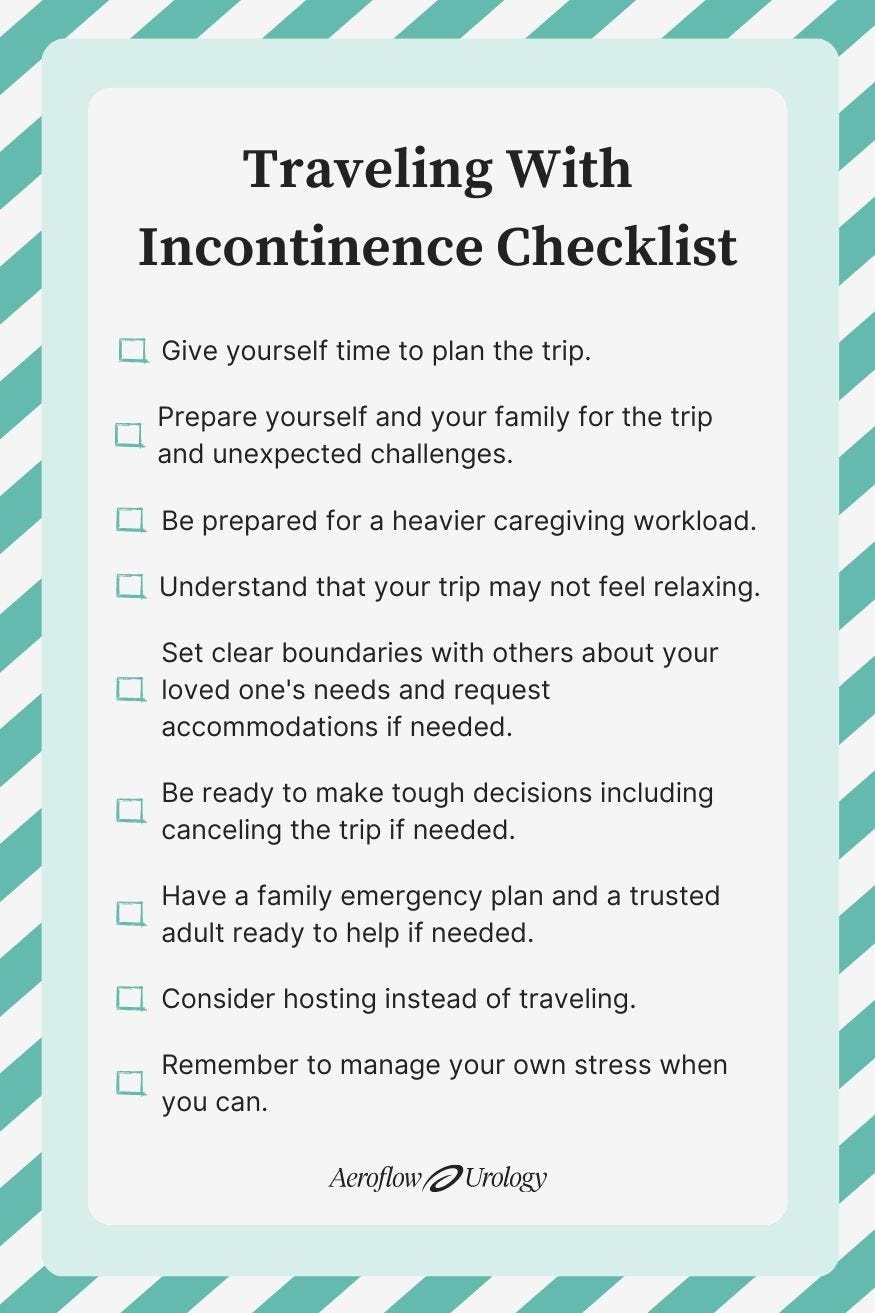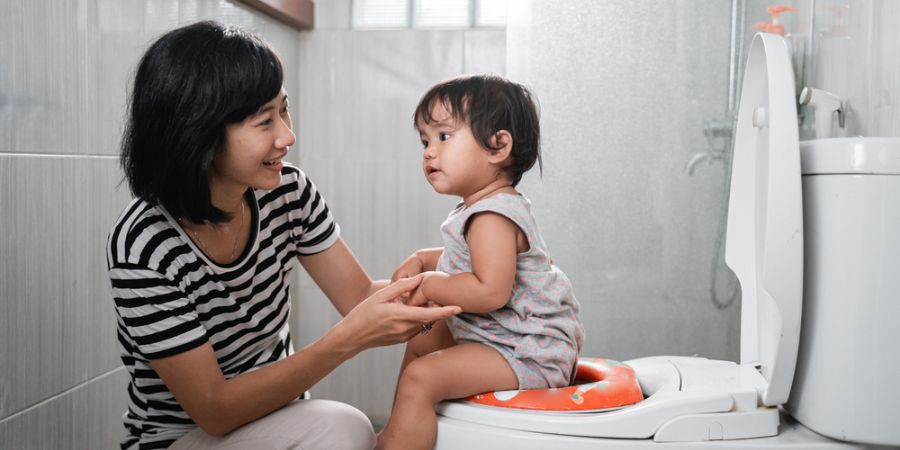Key Takeaways:
- Plan for your trip ahead of time by packing extra incontinence supplies, extra clothes and shoes, and familiar comfort items to manage accidents and maintain a sense of calmness.
- Stick to routines and schedules as much as possible, including regular breaks and meal times, to reduce anxiety and provide a sense of structure for your loved one.
- Prepare for unexpected challenges with a solid safety plan, extra transition time, and open communication about your loved one's needs.
Family trips are about spending quality time together and making good memories, so if the complex realities and stressors of taking care of your loved one with incontinence outweigh the benefits, a trip may not be easy.
However, this doesn't mean that this will always be the case; it simply means that timing and many other factors must fall into place for a successful trip to become possible.
How to Plan for Traveling With Incontinence
To avoid feeling like every outing is an expedition, consider the following points ahead of time.
Routine, Structure, & Schedules
Offer your loved one as much structure and routine as possible when traveling. Your routine should include the basics, such as meals, snacks, naps, and sleep times. If you can create as much structure and routine as possible, you can offer your loved one a more comforting environment despite the many changes in environment and transitions involved.
Predictability & Familiarity
Provide your loved one with communication of what is coming next during travel to ease anxiety surrounding the fear of the unknown. Many individuals with communication challenges, delays, or differences benefit from having visual schedules, social stories, calendars, and even timers set in place during travel. These items can help your loved one navigate the days spent in a different location. You can use Augmentative and Alternative Communication (AAC) apps via a device to help with communication. You should consult your loved one's healthcare professional for their recommendations and support well ahead of your travel time.
Behavioral Challenges
Before traveling, ensure that everyone is on the same page in terms of how to intervene and manage challenging behaviors if they arise. Put a plan in place for dealing with meltdowns. Make sure you know ahead of time where safe, private spaces are to move your loved one to during travel if these issues arise. You should also discuss and practice self-regulation, which may involve consulting a therapist or healthcare provider before your trip.
Sensory-Seeking Requirements
Get to know your loved one's sensory processing profile before traveling. This may include figuring out what sensory factors trigger them or help calm them down so you can avoid or put them into practice. For example, your loved one may require deep pressure (similar to a bear hug) to calm down. Proprioceptive input (compression from a weighted vest, specific sensory clothing, or weighted blankets) may be helpful during travel as they have a calming and soothing effect.
Always consult with your trusted healthcare professional and / or therapist for specific advice on what is appropriate and safe to use for your loved one, as weight specifications, mobility, and coordination factors also need to be considered.
Comfort & Preferred Activities
Like the points mentioned above, involve your loved one (as appropriate) in choosing a few of their preferred comfort items and activities or toys. A good idea is for your loved one to use their familiar backpack for the belongings they may need on the trip.
Safety Proofing
Remember to pack necessary items that help keep your loved one safe in unfamiliar environments. Sometimes, wandering risks unexpectedly increase when the environment is unfamiliar, and sleep is interrupted.
Vacation times are often off-routine, and so much new information is being processed. Ensure everyone knows who is on duty to supervise your loved one and the exact emergency plan. Ensure there is a very clear plan as to who is responsible for vigilance and safety-proofing at different times throughout your trip.
Medical Information
It's a good idea to have your loved one's medications with you and a printout of them (provided by your pharmacist). Keep the medications and the printout in practical, organized, waterproof containers that you can keep in your main hand luggage. Ensure that everything is easy to access and that you have no issues getting the medications, especially if you are dealing with air travel, security, and other restrictions.
Make sure you also have an accessible first aid kit containing extra things like necessary nutritional supplements (if required) and medications for pain, headache, nausea, constipation, and diarrhea. Environmental changes can mean unexpected issues, such as toileting habits and gut health changes.
Incontinence Supplies
If your loved one manages fecal or urinary incontinence, keep extra absorbent products in your carry-on bag, like diapers, wipes, pull-ups, and gloves. Keeping at least two changes of clothing and a change of shoes in hand luggage can help keep your loved one comfortable if they have an accident during travel. It's easy to roll up a complete outfit, including the underwear and socks in the bottom of backpacks.
Pack a couple of extra towels and large plastic bags if you can. This way, you can easily separate soiled, wet, or stained clothing. Remember, you always need more wipes, tissues, and sanitizer than you think! It's a good idea to bring more incontinence supplies with you than you typically would need, as these can be very costly to purchase at your destination.
If your loved one needs incontinence products for travel, they may be able to receive them for free through insurance with Aeroflow Urology. Submit our Eligibility Form with their insurance information to determine their eligibility. If they do qualify, we'll send their products directly to their home before your travels so you save time and money while planning!
Check Your Eligibility
In Under 2 Minutes
Discover the adult incontinence products available through your insurance.
Rehearsing Travel
If your loved one has never traveled, this is a crucial point to consider and rehearse for ahead of time. When rehearsing for travel, keep things positive and reinforce family connection and togetherness. You can do this by taking photos and making an album. Alternatively, you can have your loved one and relevant family members connect through a virtual call.
If you create an atmosphere of excitement that overrides stressors before leaving for your trip, your loved one will be less affected by the stress of planning.
Air Travel With Incontinence
Traveling by plane can be tricky for first-timers, but it is possible to ease the stress of the plane ride.
If you are flying for the first time, you may need to contact your airline ahead of time and attend an event where your loved one can practice being at the airport and aircraft. You should call the airline ahead of time if your loved one requires special accommodations, such as early boarding, wheelchair assistance, or dietary changes.
Don't forget to check that you've packed changes of clothing in your carry-on bag. Consider also rolling spare outfits with socks and underwear with pull-ups or diapers included. Put them in backpacks under the seats in front of you for easy access.
If incontinence is an ongoing concern and your loved one has issues waiting for toilets on an aircraft (they can get busy!), and they struggle to recognize internal body signals, try and go to the bathroom at timed intervals on the flight when restrooms are less busy.
Consider flying overnight if your flight is longer, as it is easier for your loved one to sit in one place and sleep when they are naturally tired after a busy day when the aircraft is quieter, and the lights are all dimmed. Try to stick to regular sleep times as much as possible and readjust to the time zone of your new destination as quickly as you can.
Remember to purchase or bring your loved one's preferred drinks and snacks, and pack sensory toys (if needed) and earphones so your loved one is prepared in terms of ear pressure issues and sensory sensitivities.
Car Travel With Incontinence
If traveling extensively by car, you should try several shorter trips as a family to see how things unfold. You can make day trips to appealing places, like the zoo, and practice a weekend away if you can.
This will also help you to identify what you'll need for your main trip, such as timing breaks to eat, stretch, move, play, use washrooms, and change clothing and diapers or pull-ups (as needed).
Many of the tips for airline travel will apply to car travel, but when traveling by car, it's important to remember that many individuals have difficulty sitting for prolonged periods, regardless of their exact diagnosis or lack thereof. In an aircraft, it is possible to get up and walk your loved one around, but this is not an option at all in a vehicle. Ensure you make time for opportunities for movement, such as kicking a ball, flying a kite, or running around in an open space, park, or playground.
Remember to bring entertainment for the car ride. You can bring things like your loved one's favorite music, movies, shows, or an activity such as coloring.
Caregiver Readiness Checklist for Traveling With Incontinence
- Allow as much extra time as possible to plan and organize your trip ahead of time.
- Ensure you and your family are prepared for the trip in addition to the unexpected things you can't control, such as weather delays, long wait times, traffic, public judgment, family misunderstandings, unexpected meltdowns, etc.
- Have a family emergency plan in place and the backup of a trusted adult who can pitch in to help you with your loved one.
- Be emotionally and physically prepared for an increase in the workload of caregiving. This may mean intense supervision, potential increase in behavioral challenges, managing sleep issues, or managing incontinence product changes in different environments.
- Be aware that your family vacation or trip may not feel like a time of relaxation if you're the primary caregiver of your loved one with disabilities and incontinence.
- Set realistic boundaries with others who need to know about your loved one's needs, and make requests that they accommodate appropriately. For example, can you request a quiet, safe space for your loved one in a relative's home? Remember that setting and sticking to healthy boundaries and expressing your decision to postpone a working goal, such as a trip, is your right!
- Recognize that sometimes difficult decisions must be made during travel and that timing is everything! This may mean that this year may not be suitable to tackle a trip together.
- Consider the alternatives, such as the possibility that hosting family for a holiday get-together at your home is more practical, less disruptive, and more achievable than traveling to family members' homes.
- Remember to manage your own stress when you can.
The most important tip is to remember to have fun and make things as enjoyable as possible for everyone on the trip. Remember that you know your loved one best and that you know what is right for you and your family.
Disclaimer
Information provided on the Aeroflow Urology blog is not intended as a substitute for medical advice or care from a healthcare professional. Aeroflow recommends consulting your healthcare provider if you are experiencing medical issues relating to incontinence.














